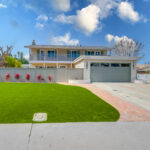 Areas with warm or hot summer nights require grasses that are drought and heat tolerant.
Areas with warm or hot summer nights require grasses that are drought and heat tolerant.
Warm Season Grasses
- Bermuda
This popular type is a strong creeping and spreading grass but it sometimes tends to develop thatchy spots. It is durable and pest-resistant but it is meant only for sunny locations. In shade, Bermuda grass becomes thin and leggy.
- Zoysia
This grass is slow to become established. It requires 3 to 4 years in most areas and weeds can take over before it makes a lawn. Deep-rooted and drought-tolerant, it becomes dormant during cold weather and tends to stay brown longer than other grasses.
- St. Augustine
This grass has a very coarse texture and is heat-tolerant. It spreads rapidly and can creep into nearby lawns and flower beds.
- Turf-Type Tall Fescues
These are slow to establish themselves but are especially tolerant of wear and drought.
Lawn Substitutes
Not all parts of your yard are well suited for grass. Areas under large trees, slopes, shady spots north of buildings and baked areas next to sidewalks or drives would be more attractive and useful hardscape feature.
- Groundcover is the most popular lawn substitute. Established beds of groundcover are green year-round and take very little care.
- Mulch can attractively cover awkward areas under dense trees or near the street where salt used to treat icy roads can sour the soil for flowers and shrubs. Adding landscaping fabric before the mulch reduces weed growth.
- Hardscape is a practical choice. A deck or patio is a useful alternative for a large area where grass won’t grow. Installing a surfaced walk in an area of high traffic will spare the grass and allow it to thrive on either side.





